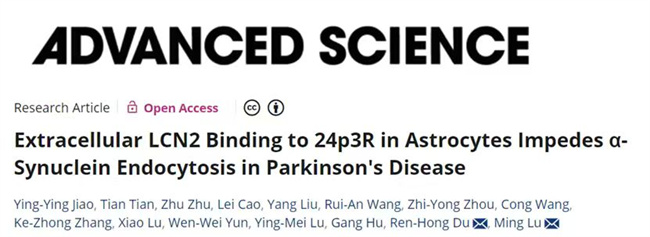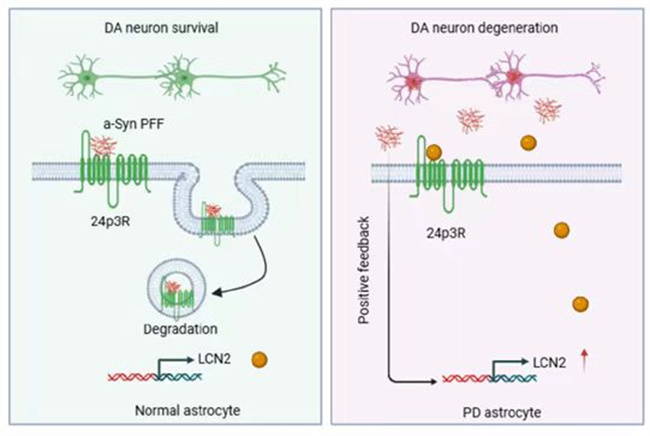Recently, Professor Lu Ming’s research group from the Department of Pharmacology at the School of Basic Medical Sciences published a research article in Advanced Science titled “Extracellular LCN2 Binding to 24p3R in Astrocytes Impedes α-Synuclein Endocytosis in Parkinson’s Disease.” For the first time, the study identified 24p3R as a novel, critical receptor for astrocyte phagocytosis of α-synuclein (α-Syn), and revealed that the LCN2/24p3R ligand-receptor pair serves as a key target in regulating α-Syn aggregation and propagation in the brain.

The pathological aggregation and spread of α-Syn are major drivers of the pathogenesis of Parkinson’s disease (PD). Affected neurons release α-Syn, and extracellular α-Syn initiates the propagation of pathological α-Syn between neurons, thereby accelerating neuronal degeneration and necrosis. Promoting the clearance of extracellular pathological α-Syn is a potential therapeutic strategy for PD and related α-synucleinopathies. Astrocytes are pivotal in the uptake and clearance of extracellular α-Syn, yet the underlying mechanisms and critical molecules regulating their phagocytosis of α-Syn had remained unknown.
Through a combiation of proteomics, transcriptomics, surface plasmon resonance, and truncated plasmid validation, the researchers identified that 24p3R as a critical receptor for astrocyte phagocytosis of α-Syn. 24p3R specifically binds α-Syn to mediate its endocytosis, while LCN2 competitively inhibits this interaction, thereby hindering astrocyte phagocytosis of α-Syn. This inhibition leads to extracellular α-Syn accumulation and propagation, which in turn stimulates astrocyte to produce and release LCN2, forming a positive feedback loop that exacerbates dopaminergic neuron degeneration.
Further studies using various astrocyte-specific conditional knockout mice confirmed that LCN2/24p3R is a critical ligand-receptor target in regulating α-Syn aggregation and propagation in the brain, providing a new theraputic strategy for PD and related α-synucleinopathies.

This study elucidates the molecular mechanism by which LCN2/24p3R regulates astrocyte phagocytosis of α-Syn, offering a novel therapeutic target for PD and related α-synucleinopathies.
Professor Lu Ming and Associate Professor Du Renhong from the Department of Pharmacology at the School of Basic Medical Sciences are co-corresponding authors of the paper. Graduate students Jiao Yingying and Tian Tian from the same department are co-first authors. The research was supported by the Ministry of Science and Technology’s 2030 “Brain Science and Brain-Inspired Research” Major Project and the National Natural Science Foundation of China.
Original article link: https://doi.org/10.1002/advs.202501694
(Drafted by Lu Ming’s Research Group; Reviewed by Chen Feng and Wang Juejin; Translation revised by Zhang Bei)



